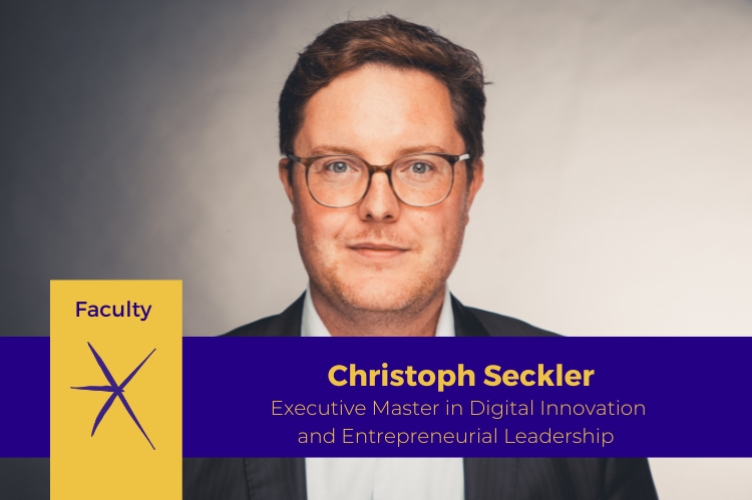Executive Master in Digital Innovation and Entrepreneurial Leadership
Meet the faculty: Christoph Seckler
 Christoph Seckler, professor of Entrepreneurial Strategy at ESCP Berlin campus and co-founder of the Center for Design Science in Entrepreneurship, believes that error management culture can spur innovation and that entrepreneurship can be a force for good in society. The German magazine Capital has awarded him the titles “Top 40 under 40” and “Top 10 Upcoming Business Scholars”. Christoph is an integral part of teaching in the Executive Master in Digital Innovation and Entrepreneurial Leadership (EMDIEL), where his focus lies on research methods, as well as learning from failures and developing resilience.
Christoph Seckler, professor of Entrepreneurial Strategy at ESCP Berlin campus and co-founder of the Center for Design Science in Entrepreneurship, believes that error management culture can spur innovation and that entrepreneurship can be a force for good in society. The German magazine Capital has awarded him the titles “Top 40 under 40” and “Top 10 Upcoming Business Scholars”. Christoph is an integral part of teaching in the Executive Master in Digital Innovation and Entrepreneurial Leadership (EMDIEL), where his focus lies on research methods, as well as learning from failures and developing resilience.
We asked Christoph some questions about his academic passions and current projects, and here are his replies:
ESCP: Christoph, you say that entrepreneurship can be a force for good in society. How exactly do you think business-savvy, entrepreneurial individuals can help society at large these days?
Christoph Seckler: For me, entrepreneurship is a mechanism for social change. I see entrepreneurs as problem solvers who can contribute to society by developing innovative and sustainable solutions to social, technological and environmental issues.
ESCP: Within research, you are particularly drawn to leveraging adversity and identifying how challenging situations can benefit individuals, teams, and organizations. How did you get to work on this topic? What is it that keeps you interested in it?
Christoph Seckler: People often start researching topics that they are close to, or that they are not so good at - in my case, both. My interest came from both personal experience and academic curiosity. I see the potential to turn adversity into a source of resilience, growth and innovation. A constructive error culture helps organizations not only to recover from difficulties, but also to continuously improve their processes and performance.
ESCP: Within your area of research, you also study how entrepreneurs can learn from failure. Especially for individual entrepreneurs, failure can be financially but also mentally devastating. What are some of the key insights you can share with us when it comes to picking yourself up after failing?
Christoph Seckler: Making mistakes is human. Only those who have never done anything challenging have never failed. Mindset is key here - it is important to see a setback as an opportunity to rethink, to learn and to grow. The setback has happened anyway, so the only question is how you now deal with it. Try to be proactive and constructive rather than passive and destructive. Instead of hiding it, beating yourself up or blaming others, try to accept that it has happened and think about what you can learn for the future before tackling the next challenge. It is particularly important for entrepreneurs to normalize mistakes in order to be able to develop resilience and innovation.
ESCP: Where do you see differences in terms of how individuals and teams leverage adversity?
Christoph Seckler: For teams, team culture and especially team error culture plays a crucial role. It was found out that team error culture is the most important predictor for team performance at Google.
ESCP: In your teaching, you aim to truly empower people to make a difference. Therefore, you don’t think teaching stops at sharing knowledge but needs strong action and interaction in the classroom to develop people’s thinking, doing, and being. How do you teach something like this?
Christoph Seckler: In class, we use an experiential learning approach to teach students how to build effective entrepreneurial teams, identify business opportunities, validate business models, and pitch their ideas successfully to investors. I also enjoy bringing in experts to share their knowledge and engage in discussions with our students. This approach has proven successful in equipping them with the right tools, skills and expertise they need to develop into successful entrepreneurial leaders.
ESCP: In your opinion, what makes for a good error culture?
Christoph Seckler: A good error culture does not celebrate the error but a good management of the error. This is why we talk about error management culture. A good error culture can be explained by the word CARLI. C stands for correcting errors, A for anticipating errors and R for risking errors to achieve higher goals. The letter L stands for learning from mistakes and finally I is about informing and talking about mistakes.
ESCP: Much has changed in the way we work over the past 5 years. How is that impacting your research focus? What are you currently working on?
Christoph Seckler: Over the past five years, the shift towards hybrid and remote work has significantly influenced my research focus. I am currently investigating error communication in hybrid work settings, examining how error management practices affect the communication of errors and their consequences. Our studies indicate that flexible working conditions enhance the communication of error consequences, while technology-heavy collaboration hinders it.
ESCP: And finally, could you share a personal failure and how you overcame it, something that would illustrate your studies and inspire others?
Christoph Seckler: In research, failure is the rule rather than the exception. Often we work for years on a research paper, only to have it rejected by a journal. I have just had a paper rejected that is very close to my heart. And this hurts. But it does not help to dwell on the pain. Instead, I try to accept the situation as it is (after some time), try to think about what could be done differently, and then to resubmit it to the next top journal.
Campus
